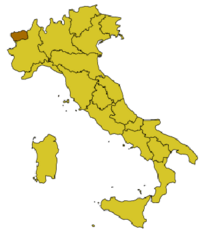
The Aosta Valley (Italian: Valle d'Aosta; French: Vallée d'Aoste; officially known as Regione Autonoma Valle d'Aosta - Région Autonome Vallée d'Aoste) is a region of Italy in the Alps, where there are the highest mountains in Europe, including Mont Blanc, Monte Rosa and Gran Paradiso (Grand Paradis).
Cities
[edit]Other destinations
[edit]- 1 Matterhorn
- 2 Mont Blanc (Monte Bianco) – The highest mountain in Europe: 4810 m above sea level
- 3 Monte Rosa
- 4 Gran Paradiso (Grand Paradis)
Understand
[edit]
Aosta Valley, which is the smallest of Italy's 20 regions, lies in the northwest of the country. It is formed by a central valley with the Dora Baltea (French: Doire baltée) river running through it and by 13 side valleys carved out by glaciers and torrents. Protected areas account for almost a third of the region, in order to safeguard biodiversity, and Aosta Valley is home to two natural parks: the Gran Paradiso (or Grand Paradis) National Park and the Mont Avic Regional Park. Known all over the world for the major climbing routes that have made mountaineering history, for its trekking itineraries and international-level ski resorts, Aosta Valley boasts an outstanding historical, cultural and artistic heritage, with Roman monuments, Mediaeval castles and Romanesque churches, as well as top-quality DOC-label wines and speciality foods.
Tourist information
[edit]- Aosta Valley tourism website
Talk
[edit]The most spoken languages in Aosta Valley are French and Italian. In Gressoney-Saint-Jean, Gressoney-La-Trinité and Issime a minority also speaks Walser German and German, which is spoken further north across the border in Switzerland. The most widespread minority language is called Arpitan or Franco-Provençal (locally, Patois valdôtain).
Get in
[edit]From ancient times, Aosta Valley has been an important crossroads of the Western Alps. Today, it is linked with France through the Mont Blanc Tunnel and the Little St. Bernard Pass, and with Switzerland through the Great St. Bernard Pass and Tunnel.
Get around
[edit]See
[edit]
Do
[edit]The Valley is an outdoor adventure lover's dream. In summer it offers a wide range of climbing and hiking options above the valley floor. In winter it is at the heart of the Italian skiing experience, with such famous areas as Courmayeur located here.
Thermal baths A great year-round activity is a visit to the Thermes de Pré-Saint-Didier. Incredibly relaxing in a beautiful setting overlooking Mont Blanc. See website for current prices and hours. Open late on Friday and Saturday evenings for nights under the stars. See Website
Summer activities
[edit]Rock climbing: There are crags bolted for sport climbing all over the area, between them offering climbs at all grades, and at lengths from 10m to over 350m. The best guide is "Mani Nude: Arrampicata sportiva in Valle d'Aosta" by Massimo Bal and Patrick Raspo. Publisher: Martini Multimedia Editore. ISBN: 88-901125-0-6. Published in 2003. New crags and sectors have been developed since the book came out, and some of the directions for reaching the climbs are not good enough, so check on websites such as http://www.climbonthe.net/valleaosta/valleaosta.htm.
Winter
[edit]Skiing
[edit]Breuil-Cervinia has access to both the Valtournenche and the Zermatt ski areas (at extra cost). However, early in the season the link to Zermatt is often closed, and the Cervinia area itself can also suffer from bad weather.
Many lifts have been upgraded in 2009, adding faster lifts with higher capacity.
Eat
[edit]Drink
[edit]- Gamay - one of the local varieties of red wine grown on the terraced vineyards visible along the steep rock walls of the valley. It is a light red and doesn't age well, so it is best enjoyed on site in full view of the land it was grown on.


